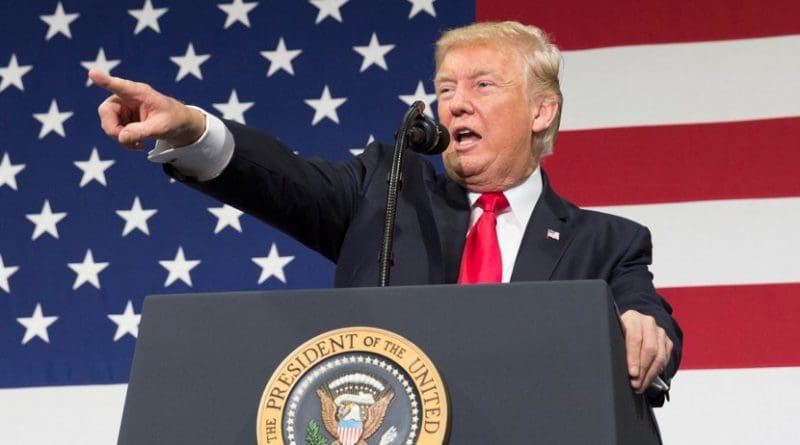Palestinians Paying The Price For Their Anti-Trump Campaign – OpEd
By Ray Hanania
Israel has carefully crafted the threat of Iran and its nuclear weapons into a wedge to drive between the sacred issue of Palestine and the Arab world, which is in near total disarray.
Iran is a regional threat, the primary enabler of Hezbollah — which has proven itself to be a powerful force in confronting Israel’s militarism — and the instigator of violence in Syria, building an alliance with Russia.
It could become a nuclear threat, but then what is the difference between Iran having nuclear weapons and Israel having nuclear weapons? Is there any doubt that Israel would use its massive nuclear arsenal to destroy any Arab country that seeks to confront its militancy and regional aggression?
Israel has wavered between taking action and resorting to rhetoric against Iran, largely based on the strong or weak support it has received from the US, which has turned a blind eye to Israel’s atrocities while exaggerating the crimes of Iran. The more America supports Israel, the more militant it is toward Iran.
Israel was angered when former President Barack Obama negotiated a treaty that gave Iran a path to moderate its relations with the West, while still building a nuclear energy base. That is one reason why Israel is close to President Donald Trump, who leans toward bluster in driving US foreign policy.
Trump wants to make peace with North Korean tyrant Kim Jong Un, but has been rebuffed almost embarrassingly by Pyongyang’s wavering. And he pumped up Israel’s expectations by suggesting that he would attack Iran.
But, this week, US Secretary of State Mike Pompeo said that Trump would not rule out face-to-face meetings with Iranian President Hassan Rouhani, who Israel and Trump have vilified repeatedly. The news sent shock waves through Israel, just as voters prepared to go to the polls to clean up the mess following Prime Minister Benjamin Netanyahu’s failed attempt to create a government following the April elections.
No one can predict Trump’s mercurial strategy, although you can predict that he tends to favor the dramatic in everything he does. This has helped him ride the unruly waves of nearly three years in office.
But Trump’s actions have consequences, and they do create opportunities.
The most important opportunity falls in the laps of the Palestinians, who seem to follow a historical routine of constantly failing to take advantage of such strategic opportunities. So far, the Palestinian leadership seems to be relishing the ongoing turmoil in its own mire, which basically means that they find contentment in the face of their ongoing suffering, oppression and tragedy.
But it does not have to be that way. The Palestinians can develop a clear and clever strategy to exploit the wedges that Trump seems unable to avoid.
Prior to becoming president, Trump was very close to the Palestinian-American community and often featured Palestinian businessmen, including Farouk Shami, the Houston multimillionaire who owns a nationwide hair-care company, on his reality TV shows.
But, when Trump was elected, the Palestinians set aside their own interests and went against Trump, making it a certainty that he would be pushed deeper into Israel’s back pocket. Why Palestinians think Obama was better for them than Trump could ever have been is beyond rational analysis. Although Obama’s rhetoric embraced empathy for the Palestinian plight, his actions solidified Israel’s policies of settler expansion and even militarism against numerous Palestinian targets in Gaza and the West Bank.
Trump understands politics in a way the Palestinians do not. It is a relative business, not one of principles. Politicians lie and exaggerate, and they break promises all the time. Some of the best American politicians have done that. And yet, many times, they end up doing the right thing. This odd behavior is driven by constituencies, alliances and self-preservation. Had the Palestinians not attacked Trump and instead tried to work with him, he might have responded with open doors and possibly moderated his assimilation into Israel’s expansionist agenda. Many of Trump’s actions, such as terminating US funding to the Palestinians, might have been prevented.
Palestinians could focus on encouraging eligible Palestinian voters in Israel, who make up nearly 20 percent of the population, to create some shock waves of their own by increasing their turnout to as close to 100 percent as possible. The Israelis clearly fear that possibility — they have pushed for laws to suppress the Palestinian vote, such as the recently defeated attempt to install cameras in polling stations — more than the Palestinians recognize the potential that a huge turnout would have on Israel and on Trump.
The de-escalation of the anti-Iran rhetoric from the Trump administration, as symbolized by Pompeo’s recent remarks, might also send a signal to the Arab world that trading Palestine’s freedom for the suppression of Iran is a bad strategy and a bad deal.
This is not about Iran, but rather about politics. Unfortunately, the Arabs have been good at reading the tea leaves but terrible when it comes to manipulating the politics.

